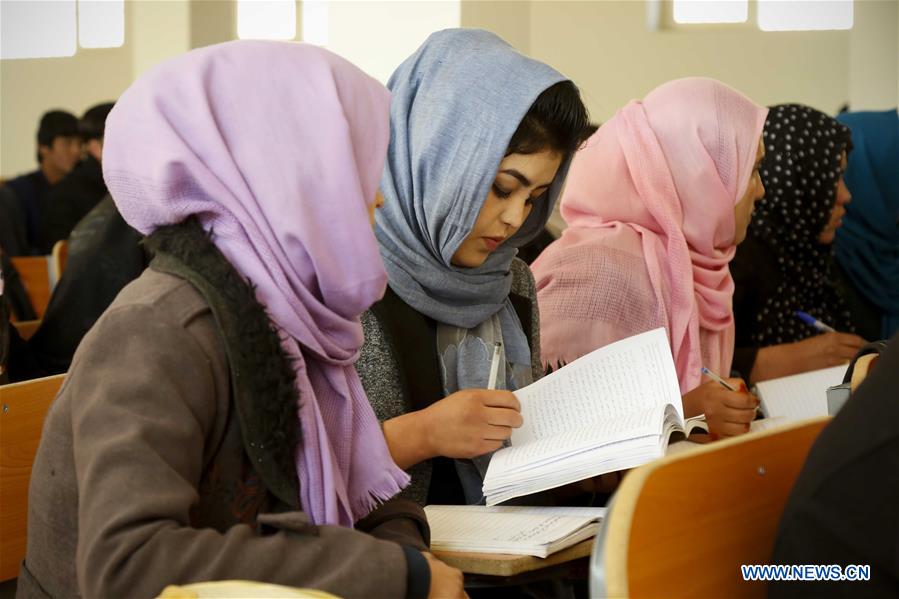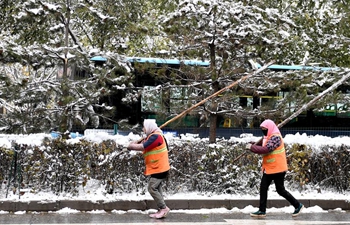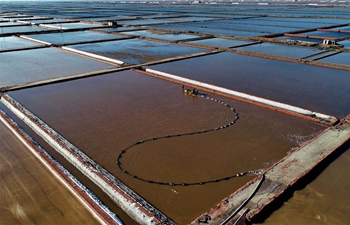
University students attend a class at Bamiyan University in Bamiyan province, central Afghanistan, Nov. 4, 2018. Established around two decades ago, but shut down by the Taliban outfit in 1997, after the armed outfit overran Bamiyan province, Bamiyan University was reopened in 2003 and since then has been serving as the main higher educational center in the highland region of Afghanistan. (Xinhua/Noor Azizi)
by Abdul Haleem
BAMIYAN, Afghanistan, Nov. 1 (Xinhua) -- "Thank God that the prevailing peaceful situation in Bamiyan has helped enable my enrollment in Bamiyan University and obtain a higher education," whispered Fatima, a second year student in the Agriculture faculty of the university.
Established around two decades ago, but shut down by the Taliban outfit in 1997, after the armed outfit overran Bamiyan province, Bamiyan University was reopened in 2003 and since then has been serving as the main higher educational center in the highland region of Afghanistan.
Although it only had two faculties, Education and Agriculture, after reopening, Bamiyan University has been rapidly developing since 2003, after the Taliban regime was overthrown in late 2001, said a member of the university Ismael Qasimyar.
"Bamiyan university reopened in 2003 with two faculties, Education and Agriculture. At that time, the university only had 200 students, with only 15 females, but the institution has been developing and today there are 6,400 students with about 2,000 of them being female who are studying in seven different faculties," said Qasimyar with pride.
Nearly 10 million children with more than 40 percent of them being girls currently go to school in Afghanistan. However, the doors of girls' schools are still closed in the areas held by the Taliban outfit.
Referring to the closure of Bamiyan University by the Taliban outfit in 1997 as "dark days" for education in the central region of Afghanistan, Qasimyar recalled with sorrow the insurgent group "destroying all of the university's infrastructure, including its library, laboratory building, research room and everything else."
Bamiyan University has been developed over the past decade and currently "it has seven faculties including Education, Agriculture, Economics, Social Sciences, Natural Science, Geology and Theology faculties," Mohammed Zahir Fayez, a senior official at the university, said.
The mountainous Bamiyan province is regarded as the safest among the insurgency-battered country's 34 provinces.
In her second year of university, Fatima, who is from central Bamiyan province, spoke with optimism to Xinhua recently about wanting to play an "active role" in developing agriculture, especially growing potatoes in the central region.
The central Bamiyan province is famous for its potato-based agribusiness in insurgency-plagued Afghanistan, as more than 60,000 farmers are engaged in potato cultivation in the province and have harvested around 350,000 tons of the vegetable this year.
As ambitious as she is, however, Fatima was skeptical about finding a job after graduating, expressing concerns that the situation in the job market is tight due to a high rate of unemployment and poverty in the country.
Echoing her concerns, another female student, Zakira, a student in the Geology faculty, lamented that many former graduates have yet to find a job.
"The majority of students after graduating remain jobless, and only a few of them have been hired by private schools, government entities, and non-government organizations," Zakira said despondently.











